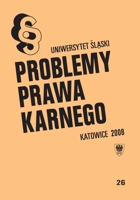Problemy kontroli formalnej aktu oskarżenia wniesionego przez oskarżyciela publicznego w polskim procesie karnym
The problems of the formal control of an accusation brought by the public prosecutor in the Polish penal trial
Author(s): Jarosław ZagrodnikSubject(s): Law, Constitution, Jurisprudence
Published by: Wydawnictwo Uniwersytetu Śląskiego
Keywords: the formal control of accusation; public prosecutor; control of the formal conditions by the court’s chief; the inefficiency of the accusation; peremptory deadline; penal proceeding; penal trial
Summary/Abstract: The standardization of the issue of the formal control of an accusation brought by the public prosecutor in Poland has long been the source of numerous controversies in the context of the penal trial. Although the very issue, in its current legal form, was regulated in a fuller scope than before, many aspects are still to be discussed. Building on the logical-linguistic analysis of the 337 art. of the 1 act in relation with the 93 art. Of the 2 act of the penal code, one should take it for granted that the control of the formal conditions of an accusation in the trial system in question is done by the court’s chief, president of the faculty or the judge, relative to the division of duties in a given court. Referring to the very same method of the analysis of a legal text, additionally supported by the observations connected with the place art 337 of the 1 act of the penal code, in the systematization of the penal-trial act, one can assume that the right to get the accusation back in order to complete the formal requirements is given to the subjects in question only till the order of delivering a copy of the accusation to the person in question is performed. An unquestionable advantage of the current regulation of the formal control of the accusation deriving from the public prosecutor is specification of the formal requirements undergoing the control in the 337 art. of the penal code, allowing for an unambiguous statement that the court’s chief examines not only the fulfillment of particular formal requirements defined in the regulations concerning the accusation (art. 333, art. 334 or art. 335 of the penal code), but also the fulfillment of the formal requirements each letter submitted in the penal trial should relate to. De lege lata it goes without saying that the order of the court’s chief concerning the return of the accusation in order to eliminate the lacks is entitled the complaint to the appropriate court to recognize the case (the 337 art. of the 2 act of the penal code). Some doubts connected with the composition of the court recognizing complaints, on the other hand, should be dispersed on the assumption that the district court, in the trial system under discussion, acts as an appeal instance, and, as a result of it, taking for granted that it is the regulation of the 30 art. of the 2 act of the penal code predicting the composition of three judges that is used in this case. The biggest interpretative difficulties connected with the 337 art. of the penal code are observed in the case of the trial consequences of the negligence of the deadline to eliminate the formal lacks of the accusation, as well as the issue of the legal nature of that deadline. […]
Journal: Problemy Prawa Karnego
- Issue Year: 26/2008
- Issue No: 1
- Page Range: 135-156
- Page Count: 22
- Language: Polish

